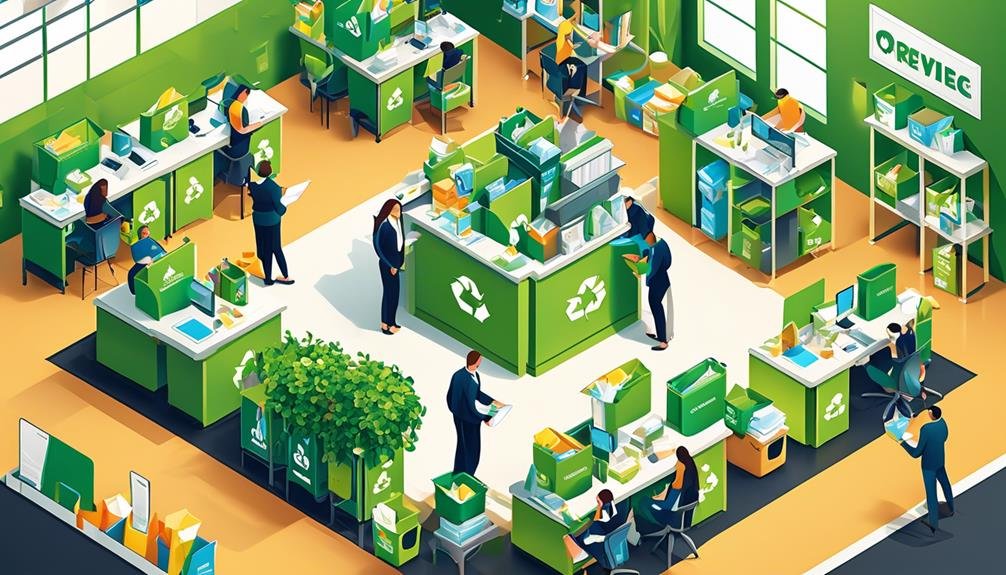Like a pilot navigating through a stormy sky, you find yourself amidst the plastic-filled wasteland of your workplace. But fear not, for there are ways to soar above this sea of plastic and live a plastic-free life even during your nine-to-five grind.
Curious to know how? Well, keep your seatbelt fastened and your tray tables upright, because we've got some expert suggestions that will help you sail through the plastic-free challenge at work.
Get ready to transform your workplace into a plastic-free haven, one step at a time.
Key Takeaways
- Invest in durable, reusable containers made from glass or stainless steel for bringing your own meals and snacks to work.
- Choose plastic-free lunch options such as fresh, unpackaged foods and buying in bulk with reusable bags or containers.
- Say no to disposable utensils and straws by bringing your own reusable options and encouraging your workplace to provide alternatives.
- Go paperless by transitioning to digital documents, saving trees and reducing plastic used in paper production and disposal.
Bring Your Own Reusable Containers
To reduce waste and live a more sustainable lifestyle at work, consider bringing your own reusable containers. By doing so, you can eliminate the need for single-use plastic containers and contribute to a healthier environment. Using reusable containers isn't only eco-friendly but also practical and convenient.
Here are a few tips to help you incorporate this sustainable practice into your work routine.
First, invest in a set of reusable containers that are suitable for your daily needs. Look for durable containers made from materials like glass or stainless steel. These materials aren't only long-lasting but also safe for storing food and beverages. Make sure to choose containers that are easy to clean and have secure lids to prevent leaks.
Next, plan your meals and snacks ahead of time. By preparing your meals at home and using your reusable containers, you can avoid relying on single-use plastic packaging or purchasing takeout meals that often come in disposable containers. This won't only save you money but also reduce waste.
Furthermore, make it a habit to carry your reusable containers with you every day. Keep them clean and ready to use. This way, you'll always have a sustainable option on hand when buying food or drinks on the go.
Opt for Plastic-Free Lunch Options
Consider exploring plastic-free lunch options to further reduce waste and promote sustainability in your workplace. By choosing plastic-free alternatives, you can make a positive impact on the environment and inspire others to do the same.
One simple option is to bring your own lunch in reusable containers made of glass, stainless steel, or silicone. These containers are durable, non-toxic, and can be used repeatedly, reducing the need for single-use plastic packaging.
Another option is to choose fresh, unpackaged foods instead of pre-packaged meals. Opt for whole fruits and vegetables, which not only come without plastic packaging but also provide essential nutrients for a healthy lunch. Additionally, consider buying in bulk and using your own reusable bags or containers to store your lunch items, such as nuts, grains, and snacks. This not only reduces plastic waste but can also save you money in the long run.
If you prefer to eat out for lunch, look for restaurants or cafes that offer plastic-free alternatives. Ask for your meal to be served on a plate instead of in a plastic container, and bring your own reusable utensils to avoid using disposable plastic cutlery. Supporting businesses that prioritize sustainability can help drive change and encourage others to adopt plastic-free practices.
Say No to Disposable Utensils and Straws

Avoid disposable utensils and straws to reduce plastic waste and promote sustainability in your workplace. By making this simple change, you can have a big impact on the environment.
Here are some practical tips to help you say no to disposable utensils and straws:
- Bring your own reusable utensils: Invest in a set of stainless steel or bamboo utensils that you can keep at your desk or in your bag. This way, you'll always have them on hand whenever you need them.
- Pack a reusable straw: Instead of using plastic straws, opt for a reusable one made from stainless steel or silicone. Keep it in your bag or at your desk, and use it whenever you want to enjoy a refreshing drink.
- Encourage your workplace to provide reusable alternatives: Talk to your colleagues or management about the benefits of using reusable utensils and straws. Suggest implementing a system where everyone has their own set of utensils and straws to use during lunch breaks or office parties.
- Spread awareness: Educate your coworkers about the environmental impact of disposable utensils and straws. Share facts and statistics to encourage them to make the switch to reusable options.
Go Paperless With Digital Documents
When it comes to reducing plastic waste and promoting sustainability in your workplace, another impactful step you can take is to embrace the practice of going paperless with digital documents. By transitioning from traditional paper-based processes to digital ones, you not only save trees but also reduce the amount of plastic used in the production and disposal of paper.
To help you understand the benefits of going paperless, here is a comparison between paper-based and digital documents:
| Paper-Based Documents | Digital Documents |
|---|---|
| Require physical storage space | Can be stored electronically |
| Can easily get lost or damaged | Can be backed up and protected |
| Need to be printed and copied | Can be shared digitally |
| Contribute to deforestation | Help save trees |
Embracing digital documents not only reduces plastic waste but also increases efficiency and productivity in the workplace. By utilizing tools like cloud storage, email attachments, and electronic signatures, you can eliminate the need for paper and streamline your workflows.
Encourage and Participate in Recycling Initiatives

To promote a culture of sustainability and reduce plastic waste in the workplace, encourage and actively participate in recycling initiatives. By taking these steps, you can make a significant impact on the environment and inspire others to do the same:
- Set up designated recycling bins throughout the office for paper, plastic, glass, and other recyclable materials. Clearly label each bin to ensure proper sorting.
- Educate your colleagues about the importance of recycling and provide them with guidelines on what can and can't be recycled. This will help prevent contamination and maximize the effectiveness of the recycling program.
- Encourage the use of reusable containers and utensils in the office kitchen. Provide options such as reusable water bottles, coffee mugs, and food storage containers, reducing the need for single-use plastics.
- Partner with local recycling centers or organizations to organize recycling drives or collection events. This won't only increase recycling rates but also create a sense of community involvement and engagement.
Frequently Asked Questions
How Can I Reduce Plastic Waste When It Comes to Office Supplies?
You can reduce plastic waste with office supplies by opting for alternatives like refillable pens, paper clips made from metal or biodegradable materials, and using reusable folders or binders instead of plastic ones.
What Are Some Alternatives to Plastic Water Bottles at Work?
To live plastic-free at work, consider using alternatives to plastic water bottles. Opt for a reusable water bottle made of stainless steel or glass. This way, you can stay hydrated without contributing to plastic waste.
Are There Any Tips for Reducing Plastic Waste During Office Meetings or Conferences?
To reduce plastic waste in office meetings or conferences, bring your own reusable water bottle and coffee cup, use digital documents instead of printing, and encourage others to do the same.
How Can I Encourage My Colleagues to Adopt Plastic-Free Practices at Work?
Encourage your colleagues to adopt plastic-free practices at work by leading by example. Show them how easy it is to use reusable water bottles, bring lunch in containers, and avoid single-use plastic items.
What Are Some Eco-Friendly Alternatives to Plastic Packaging for Shipping and Receiving Materials at the Workplace?
Consider using eco-friendly alternatives like cardboard boxes, paper padding, and biodegradable packing peanuts when shipping and receiving materials at work. These options reduce plastic waste and demonstrate your commitment to a sustainable workplace.
Conclusion
In conclusion, living plastic-free at work isn't only possible but also beneficial for the environment. By bringing your own reusable containers, opting for plastic-free lunch options, saying no to disposable utensils and straws, going paperless with digital documents, and actively participating in recycling initiatives, you can make a significant impact.
These simple steps won't only reduce plastic waste but also inspire others to follow suit, creating a more sustainable workplace for everyone. Start making a difference today!





